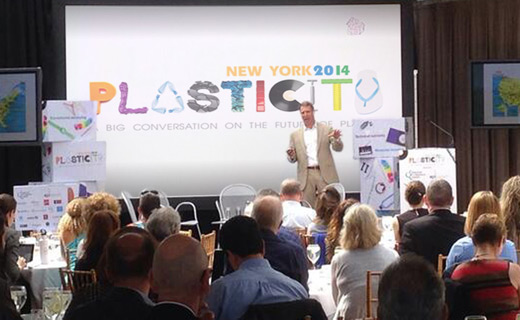New Closed Loop Fund sparks controversy
At this year’s Plasticity Forum, MBA founder Mike Biddle and an impressive line-up of leaders from many different fields tackled the question of “The Future of Plastics”. Other speakers included former President of Costa Rica Jose Maria Figueres, now Co-Chair of the Global Ocean Commission and President of the Carbon War Room; Bill McDonough, a world sustainability leader in the area of design, co-author of Cradle to Cradle and recently appointed Chairman of the World Economic Forum’s Meta-Council on the Circular Economy; and New York’s ex-‘Recycling Czar’ Ron Gonen, who has collaborated with major companies to establish the Closed Loop Fund. Mike invited McDonough to speak on how plastics fit into Circular Economy principles and he is shown below being interviewed by Mike after his presentation. Mike invited Gonen to speak at the forum to share his ambitions for the fund, which will loan $100m to US municipalities working to improve waste recycling rates and recycling infrastructure.
Gonen has a strong reputation for scaling up recycling efforts, having founded Recyclebank and grown it to service 50 cities and 1m households in six years. He also expanded recycling efforts in New York during his two-year tenure, increasing paper and textile collections in schools, launching e-waste collections and banning polystyrene foam.
The Closed Loop Fund’s founding investors include some of the world’s biggest consumer goods companies: Walmart, Coca-Cola, PepsiCo, P&G and Unilever. According to Plastics News, they decided to start the fund to help boost recycling rates in the US, where recycling rates still lag behind Europe. Just 13% of plastics are recycled in the US, compared to 33% in Europe, where there are plans afoot to ban certain hazardous plastics and introduce binding targets on plastic waste.

Municipalities can win zero-interest loans from the fund by putting forward worthy projects. However, will the loan really help to scale up high impact recycling schemes, or is it a just another sustainability play from big corporations keen to pass the buck? This is the question posed by Upstream in a recent piece for the Guardian. The company argues that the fund’s goal of providing 100% of US consumers with access to recycling is unrealistic.
The $100m may sound like a lot, it says, but it’s a drop in the ocean compared to the participating companies’ combined annual profits ($61.3bn), and won’t be sufficient to help states and cities keen to make progress on recycling. Minnesota alone spends up to $70m annually to fund its curbside recycling programme, for example, while San Jose recently spent $50 million modernising its material recovery facility. Also, since this is purely a loan, local governments will eventually need to find new funding to continue their efforts.

A consortium of public interest groups, including Upstream, 5 Gyres, Eureka Recycling, Green America, Story of Stuff Project and Texas Campaign for the Environment, have openly criticised the fund, and called upon the companies involved to back ‘proven policies’ to boost recycling such as extended producer responsibility, already widely adopted in Europe, which holds consumer goods companies financially responsible for the collection and recycling of their waste packaging.
So what do you think about the Closed Loop Fund? Should major companies step up and take more responsibility for investing in recycling solutions? Let us know by contacting us.

